Related Research Articles

Mary Isobel Catherine Bernadette O'Brien, better known by her stage name Dusty Springfield, was an English singer. With her distinctive mezzo-soprano sound, she was a popular singer of blue-eyed soul, pop and dramatic ballads, with French chanson, country, and jazz in her repertoire. During her 1960s peak, she ranked among the most successful British female performers on both sides of the Atlantic. Her image–marked by a peroxide blonde bouffant/beehive hairstyle, heavy makeup and evening gowns, as well as stylised, gestural performances–made her an icon of the Swinging Sixties.
Thomas Randolph Bell was an American record producer, arranger, and songwriter known as one of the creators of Philadelphia soul in the 1970s. Hailed as one of the most prolific R&B songwriters and producers ever, Bell found success crafting songs for Delfonics, Stylistics, and Spinners. In June 2006, Bell was inducted into the Songwriters Hall of Fame. In 2016, Bell was inducted into the Musicians Hall of Fame and Museum.
Linda Diane Creed, also known by her married name Linda Epstein, was an American songwriter and lyricist who teamed up with Thom Bell to produce some of the most successful Philadelphia soul groups of the 1970s.
Philadelphia International Records (PIR) was an American record label based in Philadelphia, Pennsylvania. It was founded in 1971 by songwriting and production duo Kenneth Gamble and Leon Huff along with their longtime collaborator Thom Bell. It was known for showcasing the Philadelphia soul music genre that was founded on the gospel, doo-wop and soul music of the time. This sound later marked a prominent and distinct era within the R&B genre. During the 1970s, the label released a string of worldwide hits that emphasized lavish orchestral instrumentation, heavy bass and driving percussion.
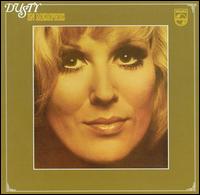
Dusty in Memphis is the fifth studio album by English singer Dusty Springfield. Initial sessions were recorded at American Sound Studio in Memphis, while Springfield's final vocals and the album's orchestral parts were recorded at Atlantic Records' New York City studios. The album was released in March 1969 in the United States by Atlantic Records, and Philips Records distributed the record outside the U.S. Springfield worked on the album with a team of musicians and producers that included Jerry Wexler, Arif Mardin, Tom Dowd, conductor Gene Orloff, backing vocalists the Sweet Inspirations, bassist Tommy Cogbill, and guitarist Reggie Young.

"I'm Gonna Make You Love Me" is a soul song most popularly released as a joint single performed by Diana Ross & the Supremes and the Temptations for the Motown label. This version peaked for two weeks at No. 2 on the Hot 100 in the United States, selling 900,000 copies in its first two weeks, and at No. 3 on the UK Singles Chart in January 1969.
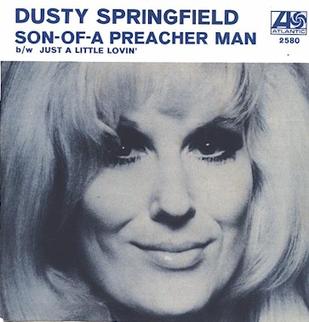
"Son of a Preacher Man" is a song written and composed by American songwriters John Hurley and Ronnie Wilkins and recorded by British singer Dusty Springfield in September 1968 for the album Dusty in Memphis.

The Sweet Inspirations are an American R&B girl group mostly known for their work as backup singers on studio recordings for other R&B and rock artists. A founding member of the group was Dionne Warwick, who was later replaced by her aunt, Cissy Houston.
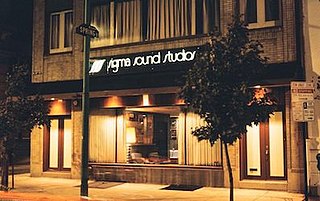
Sigma Sound Studios was an American independent recording studio in Philadelphia, Pennsylvania, founded in 1968 by recording engineer Joseph Tarsia. Located at 212 North 12th Street in Philadelphia, Sigma Sound is closely associated with Philadelphia soul, and was the location of numerous recordings of Gamble and Huff's Philadelphia International Records, the group of session musicians known as MFSB, and producer Thom Bell.

A Brand New Me is the sixth studio album by English singer Dusty Springfield, released in 1970.

"I Just Don't Know What to Do with Myself" is a song written by Burt Bacharach and lyricist Hal David.

The Stylistics is the debut album by American R&B group the Stylistics, released in November 1971 on the Avco record label. It was produced by Thom Bell and recorded at Sigma Sound Studios in Philadelphia. The album has been called "a sweet soul landmark."

The discography of English pop singer Dusty Springfield includes twenty one studio albums, one live album, thirty compilations, four extended plays and sixty-nine singles. Some of Springfield's albums and singles were unreleased, most notably 1974's Longing. Additionally, many of her early US album releases were released by the US arm of Philips Records, using material recorded in England and America with US and UK single releases included and re-ordered. Thus, these album releases were often collections of her recordings that were not intended by Springfield to have been released as proper albums at all. From 1969 on through 2015, her albums were released simultaneously in the US and the UK, though occasionally with different names and artwork, but the same track listings. Only 1968's Dusty... Definitely and 1972's See All Her Faces and 1982's White Heat deviated from that format.
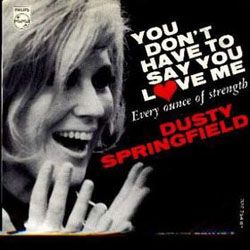
"You Don't Have to Say You Love Me" is a 1966 hit recorded by English singer Dusty Springfield that proved to be her most successful single, reaching number one on the UK Singles Chart and number four on the Billboard Hot 100. It is the cover of a 1965 Italian song by Pino Donaggio and Vito Pallavicini, titled "Io che non vivo (senza te)". Elvis Presley recorded another cover version in 1970 which was a hit in both the US and the UK. Other covers have charted in the UK, Ireland, Italy and Finland.
Cheryl Elizabeth Gamble, better known by her stage name Coko, is an American singer-songwriter best known as the lead singer of the R&B vocal trio Sisters With Voices (SWV). Aside from her R&B career, Gamble also has a solo gospel career. As a member of SWV, Coko has sold 10 million records in the US, and 25 million records worldwide, and is a four-time Grammy Award nominee.

"I Only Want to Be with You" is a song written by Mike Hawker and Ivor Raymonde. The debut solo single released by British singer Dusty Springfield under her long-time producer Johnny Franz, "I Only Want to Be with You" peaked at number 4 on the UK Singles chart in January 1964.

"The Windmills of Your Mind" is a song with music by French composer Michel Legrand and English lyrics written by American lyricists Alan and Marilyn Bergman. French lyrics, under the title "Les Moulins de mon cœur", were written by Eddy Marnay.

"Hope That We Can Be Together Soon is a song written by Kenneth Gamble and Leon Huff, which was originally recorded by Dusty Springfield as "Let's Get Together Soon" for her 1970 album, A Brand New Me. The track was produced by Gamble and Huff.

Identify Yourself is a 1979 album by American R&B group the O'Jays, released on the Philadelphia International Records label. It was recorded at Sigma Sound Studios in Philadelphia, with four tracks produced by Kenny Gamble and Leon Huff, three by group members Eddie Levert and Walter Williams and one by the esteemed Philadelphia producer and composer Thom Bell.
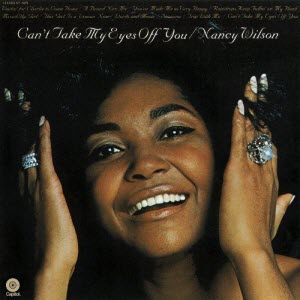
Can't Take My Eyes Off You is a studio album by Nancy Wilson, released on Capitol Records in 1970. It was produced by David Cavanaugh, with arrangements and conducting by Phil Wright and Jimmy Jones.
References
- ↑ "Spotlight Singles" (PDF). Billboard. October 25, 1969. p. 91. Retrieved 2021-02-20.
- ↑ "Dusty Springfield Chart History (Hot 100)". Billboard. Retrieved March 19, 2020.
- ↑ "Dusty Springfield Chart History (Adult Contemporary)". Billboard. Retrieved March 19, 2020.
- ↑ William Clark, Jim Cogan Temples of Sound: Inside the Great Recording Studios -2003 Page 156 "For his material, Butler joined forces writing with Gamble, Huff, and Thom Bell. Huff or Bell worked out the melodies. Gamble and Butler assembled the words. They penned "Hey Western Union Man." "Brand New Me," and "Never Give You